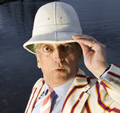
Oh frabjous day! Steven Goddard is joining “potty peer” Christopher, Viscount Monckton of Brenchley as one of the slithy toves contributing to the Science and Public Policy Institute‘s never-ending stream of climate denier propaganda, and on the evidence of his first “paper” he will be a valuable* addition to the team. The SPPI pantheon is in dire need of a fillip, given Monckton’s lacklustre recent performance (of which more later), and so Goddard is given his head to produce a truly wondrous counterblast to the recent NOAA 2010 Arctic Report Card — To a geologist, “the past is key to the future”. To give you a flavour of his wisdom, here are Goddard’s conclusions:
- The widespread belief that the poles are rapidly melting down is incorrect, particularly in the Southern Hemisphere.
- Arctic temperatures are cyclical. Much of the Arctic has been warmer during the last 100 years.
- The satellite record from 1979-2010 coincided with the warm phase of the PDO. It covers less than one half of an Arctic temperature cycle. Given this cyclical behavior, it makes little scientific sense to extrapolate linearly based on a time period which is too short. Until satellites record at least one entire Arctic cycle, the extrapolations are misleading.
- There is little (if any) evidence linking recent changes in the Arctic to CO2. At this point there is no solid reason to believe we are seeing anything other than natural Arctic cycles. Greenland temperatures are cooler than 70 years ago.
Great stuff. Either completely wrong, not supported by the evidence or pure wishful thinking. Positively Moncktonian in its cavalier disregard for the facts, but lacking the great man’s prolix delivery and intellectual turgidity…
Followers of events in the Arctic will know Goddard as the erstwhile author of numerous and inventive “sea ice updates” at Anthony Watts’ µWatts blog — a man with an amazing ability to conjure cooling out of nothing. A few months ago an obdurate Goddard appears to have strained the patience of the saintly Watts and he departed to set up his own blog called, with no apparent hint of irony, Real Science.
To illustrate just how far Goddard’s SPPI opus stays from reality, let’s consider his claim that “Greenland temperatures are cooler than 70 years ago“. To arrive at this conclusion he chooses two Greenland temperature stations from the NASA GISTEMP dataset (Godthab Nuuk and Angmagssalik), plots their annual averages over the last 100 years, finds two periods of warming, and then — after long detours around sea ice and CO2 — declares that Greenland has cooled over the last 70 years. Cherry-picking at its finest…
What does the NOAA Arctic Report Card have to say about current Greenland temperatures?
A clear pattern of exceptional and record-setting warm air temperatures is evident at long-term meteorological stations around Greenland. For instance:
Nuuk (64.2°N along Greenland’s west coast): Year 2010 summer, spring, and winter 2009/2010 were the warmest on record since record keeping began in 1873.
Temperature records were being set all round Greenland during the last year, leading to a record ice melt season: the area of the ice sheet that melted was 8% greater than the previous record, set in 2007, and melt continued for much longer than usual:
The melt duration was as much as 50 days greater than average in areas of west Greenland that had an elevation between 1200 and 2400 meters above sea level.
The obvious disconnect between Goddard’s reporting and the real state of Greenland goes a long way to suggest why he was dropped by Watts, and it says just as much about SPPI’s decision to run his material. To paraphrase former NZ prime minister Rob Muldoon, Goddard’s move has raised the average IQ at both places…
Meanwhile, followers of the antics of Monckton will be puzzled by the poor quality of his recent output, and mystified by his inability to carry the floor at a recent debate in Cork. The peer’s attempted rebuttal of the dismemberment of his testimony to Congress earlier this year is thin stuff, long on words (of course) but woefully short of substance.
Slightly meatier is his attempt to debunk a recent keynote address given by Obama’s science adviser John Holdren in Oslo in September. Here’s a chunk of classic Monckton:
On go the lurid scares. “Melting permafrost” is next. The fact that many of the burial grounds of the Vikings around the Hvalsey settlement are still under permafrost to this day, when they were certainly not under permafrost when the bodies were buried, is conveniently overlooked.
This is a claim that has popped up in a number of Monckton’s articles, and one that’s often repeated by sceptics who want to pretend that conditions in Greenland are not unusual. Unfortunately, as is so often the case when you look into the details, it turns out that Monckton is talking nonsense. The Citizen’s Challenge blog decided to do some exhumation of the facts, and got in touch with a few experts who know the Hvalsey site well. Here’s what Georg Nyegaard, curator of the Greenland National Museum & Archives had to say:
I know the site of the Hvalsey Fjord Church very well – was the curator of the nearby museum of Qaqortoq for 12 years. You are completely right about your doubts: There is absolutely no permafrost at this site.
I look forward to Monckton’s retraction and apology for so grievously misleading his readers, but history suggests I would not be wise to hold my breath while waiting. But Monckton isn’t finished with permafrost. Here’s his next sentence:
In fact, melting permafrost is nothing but a good thing: despite the lurid tales of methane trapped in the permafrost and waiting to erupt and give the planet a fever, methane is really a non-issue now that the Russian pipeline to Europe has been repaired. There has been no noticeable increase in atmospheric methane since the repairs were completed in the year 2000. If the permafrost were to thaw, billions of acres of productive agricultural land would become available.
Breathtaking stuff. Manages to ignore the evidence, downplay the danger, and blame the Russians, all in one sentence. It’s the sort of claim Monckton can make in a debate, leaving his opponents wondering whether they should unpack the falsehoods or ignore them. But such sophistry didn’t work for the prolix peer when he took part in a debate with Graham Parkes, professor of philosophy and head of the school of sociology and philosophy for University College Cork, at the beginning of October. Scott Mandia has Parkes’ full speech here.
The result? Parkes won the debate by 100 votes to 3. Sic transit gloria Moncktonii…
(*) “Valuable”, in so far as it makes SPPI’s output look even less credible (if that’s possible).

 Britain’s most bumptious climate crank, Christopher, Viscount
Britain’s most bumptious climate crank, Christopher, Viscount 